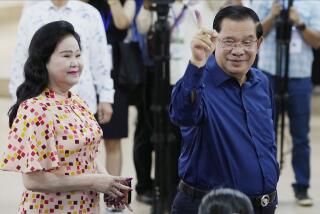Cambodia Peace Talks End on Note of Progress
- Share via
PATTAYA, Thailand — The four factions in Cambodia’s civil war concluded three days of talks Wednesday that produced the greatest progress in years of negotiations and raised hopes that regional powers such as Japan and Australia are preparing to end Cambodia’s international isolation.
Seated in front of a new Cambodian flag--Cambodia outlined in white against a sky-blue background--former Cambodian leader Prince Norodom Sihanouk said the talks marked the start of the final chapter in more than two decades of suffering by his people.
“We’re in the final phase of a long, long race,” Sihanouk told a closing news conference in this seaside tourist village.
While no overall peace settlement was agreed upon during the talks, the four factions managed to achieve progress on key points. But the delicate balance in the talks was evident Wednesday morning when the Khmer Rouge guerrillas refused to appear at a press conference alongside Phnom Penh Premier Hun Sen.
The Pattaya meeting represented the first working session of the so-called Supreme National Council, a joint steering committee comprising six representatives from the Phnom Penh government and six from the tripartite resistance coalition that has been fighting Phnom Penh since 1979.
For the first time, the four parties laid aside a leadership wrangle and chose Sihanouk as the “convener” of council meetings, allowing the group to get to work.
The council’s first decision was to declare a cease-fire in the civil war and order a halt to foreign arms shipments to the factions.
The council also decided to set up a headquarters in Phnom Penh and permit the three resistance factions to send delegations to the capital under protection of their soldiers and Phnom Penh troops.
At the news conference, Sihanouk said he had received a “signal” from Australia that it is considering recognition of the Supreme National Council. A Japanese diplomat said his government will take similar action, and Thailand said Wednesday night that it will recognize the SNC when it is established in Phnom Penh.
The Phnom Penh regime has been diplomatically isolated since the Vietnamese army invaded in 1978 and ousted the Communist Khmer Rouge. It has relations only with Vietnam, Laos, India and the countries of the former East Bloc.
The Supreme National Council, which Sihanouk dubbed a “super government,” agreed to send a delegation to the autumn U.N. General Assembly meeting, as well as other international agencies.
The council is a hybrid government body with no real authority; each faction will continue to rule where it currently holds power.
More to Read
Sign up for Essential California
The most important California stories and recommendations in your inbox every morning.
You may occasionally receive promotional content from the Los Angeles Times.












